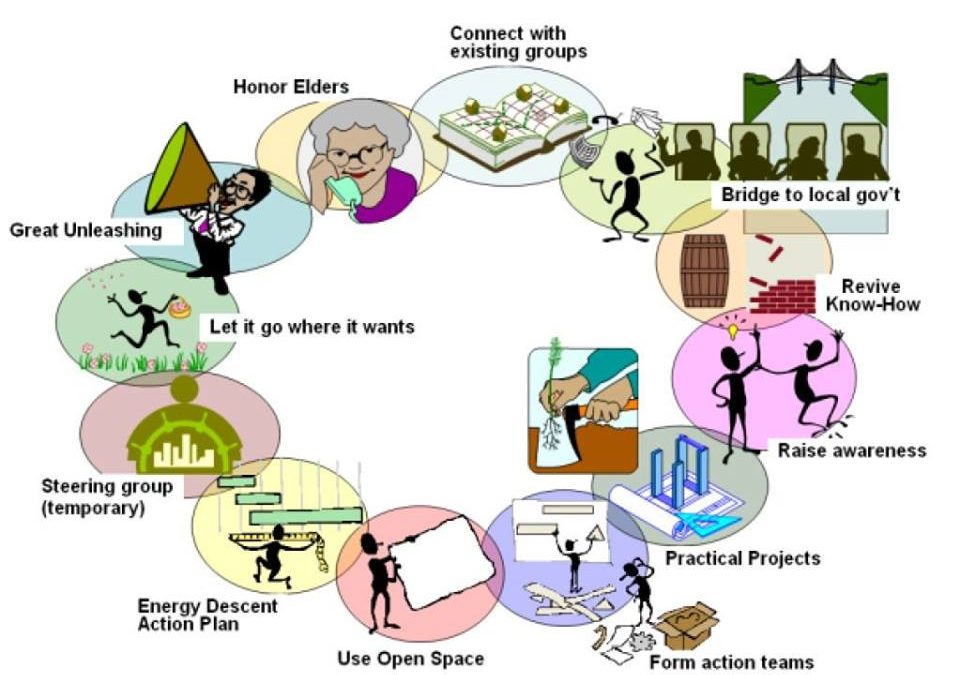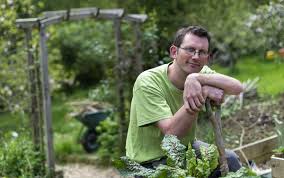This month I will focus on another of the resources listed here in the blog, the Transition Town movement. A Transition Town is a place where there’s a community-led process that helps that a town/village/city/neighborhood find creative solutions to the global challenges of peak oil, climate change, economic hardship and shrinking supplies of cheap energy. Many people complain about the huge and seemingly insoluble global issues facing us right now. Transition Town is about getting up and doing something constructive about it along with our neighbors and fellow townsfolk. It’s happening in well over a thousand highly diverse communities across the world – from towns in Australia to neighborhoods in Portugal, from cities in Brazil to rural communities in Slovenia, from urban locations in Britain to islands off the coast of Canada. These communities have started up projects in areas of food, transport, energy, education, housing, waste, arts etc. as small-scale local responses to the global challenges of climate change, economic hardship and shrinking supplies of cheap energy. Together, these small-scale responses make up something much bigger, and help show the way forward for governments, business and the rest of us.
https://www.youtube.com/watch?v=KYQyCMb9WgY
For instance, a Transition group in Brixton raised the money to install the UK’s first inner-city, community-owned power station, consisting of 82kW of solar panels on top of a council estate. A group in Derbyshire created a food hub that makes it economically viable to grow food in back gardens for sale, as an affordable alternative to supermarkets. And groups in Totnes, Stroud, Brixton and Bristol launched their own local currencies. Taken on their own, these initiatives may not make a vast difference. “But when there are thousands of communities worldwide all weaving their bit in a larger tapestry,” Rob Hopkins, founder of the Transition Town movement, says, “it adds up to something awe-inspiring and strong.”
In 1996, having earned a degree in Environmental Quality and Resource Management, Hopkins moved from the UK to Ireland, and began teaching permaculture and natural building at Kinsale College of Further Education, where he set up the world’s first full-time two year permaculture course, as well as co-ordinating the first eco-village development to be granted planning permission in Ireland. In 2004, he became aware of the concept of peak oil, and set his students the task of applying permaculture principles to addressing this challenge. The output of this student project was the ‘Kinsale Energy Descent Action Plan’, which was uploaded to the college website. Much to the surprise of the authors, it was downloaded by interested parties around the world. In 2005, Hopkins moved to Totnes, England, and there co-founded Transition Town Totnes, the first official Transition Town, basing his actions on the same permaculture principles that underpinned his work in Kinsale. In 2007, he co-founded the Transition Network, a charity designed to support the many Transition initiatives emerging around the world, inspired by the processes begun in Kinsale and Totnes. Since then he has been writing and speaking widely about the theory and practice of Transition Towns.
“There is no cavalry coming to the rescue,” he says. “But what happens when ordinary people decide that they are the cavalry? Between the things we can do as individuals, and the things government and business can do to respond to the challenges of our times, lies a great untapped potential. It’s about what you can create with the help of the people who live in your street, your neighborhood, your town. If enough people do it, it can lead to real impact, to real jobs and real transformation of the places we live, and beyond.”
As Hopkins emphasizes, ‘transitioning’ is both an inner and out process. Change is needed not only in the external physical structures, institutions, and organizations upon which societies rest, but also in our worldviews, norms, attitudes, and values. In recognition of this, the Transition model of change attempts to weave together the power of imagination, visioning, and storytelling, with the practical manifestation of these alternative narratives, through the engagement of the head, the heart, and the hands.
12 Key Ingredients
Local projects are usually based on the twelve key ingredients of the Transition model:
1. Set up a steering group and design its demise/transformation from the outset
2. Start raising awareness
3. Lay the foundations
4. Organize a Great Unleashing:
http://transitionus.org/stories/transition-whatcom-great-unleashing
5. Form theme (or special interest) groups
6. Use Open Space
A quick introduction to Open Space can be found on Harrison Owen’s website.
(http://www.openspaceworld.com/users_guide.htm)
7. Develop visible practical manifestations of the project
Check out some of the other projects and see if there’s something there that might inspire your
own first visible manifestation: https://www.transitionnetwork.org/projects
8. Facilitate the Great Reskilling: A posting on Transition Culture on the Great Reskilling:
9. Build a bridge to Local Government
Here’s an example from Monteveglio, Italy:
10. Honor the elders
11. Let it go where it wants to go…
12. Create an Energy Descent Action Plan
http://en.wikipedia.org/wiki/Energy_descent
On a global scale, the movement is still small, but so were the Civil Rights, the Women’s rights, sexual liberation, LGBTI movements once; they looked too small to effect change. But tipping points arrive, often unexpectedly, when suddenly things change. It could be that we are at the pre-tipping point stage with Transition and the potential is definitely there.
The Transition Network has just released a new documentary about the movement; check out the trailer, or the entire film on Youtube:
In Transition 2.0 Trailer
https://www.youtube.com/watch?v=XKN3RLkEGfM
In Transition 2.0: a story of resilience and hope in extraordinary times
References
“What is a Transition Initiative?”
https://www.transitionnetwork.org/support/what-transition-initiative
“The twelve key ingredients to the Transition model”
https://www.transitionnetwork.org/support/12-ingredients
Wikipedia: “Transition Town”
http://en.wikipedia.org/wiki/Transition_town#cite_note-12Ingredients-2
“Local, self-sufficient, optimistic: are Transition Towns the way forward?”
http://www.theguardian.com/environment/2013/jun/15/transition-towns-way-forward
http://en.wikipedia.org/wiki/Rob_Hopkins



BRAVO! Chaz’s undertaking here is one person’s Blessing to his, and our, world. I share with you all my gratitude for his passion to live and give passionately.
Thanks William – cheers to passion!
Thank you for this wonderfully inspiring blog Chaz and for getting the word out about this amazing global project! You have a fantastic site here, keep up the good work and keep disseminating the positive news!! Much love and light to you….:)
Thanks Katya – I’m trying to find a couple/few studetns to help translate it into Chinese….
Very impressive, Chaz! I bet lots of students would love to join this and offer help.
Thanks Jenny! But I’m not sure which Jenny, among many I know as friends, this is….?
Thank you again for the amazing links and resources Chaz. I’m visiting tonight to get ideas for the unit on the environment my AP French students are doing – we started out looking at what is at stake at the Climate Conference in Paris this Dec and we’ll be looking at most promising new solutions. The Transition Town certainly seems to be one! I just heard a radio report on NPR about Ithaca New York’s Eco Village….thank you, thank you, thank you and keep up the good work!!
Thanks Katya – I’m glad you can use some of the resources here, and hope we can continue to collaborate to inspire youth to help create a better world!
great points altogether, you simply gained a brand new reader. What would you recommend about your post that you made some days ago? Any positive?
Hi Beauty..thank you! Which post? Positive what?
Hello, you used to write excellent, but the last several posts have been kinda boring?I miss your super writings. Past several posts are just a little bit out of track! come on!
I am no longer certain the place you are getting your information, but great topic. I must spend some time studying much more or understanding more. Thanks for magnificent info I was in search of this info for my mission.
improve erectile dysfunction
erection pills online viagra
erectile psychological
hello guos 9128738518
hello guos 9128738515